General
Chancellor Calls for Appreciation of Global Interconnectedness at 4th Kampala Geopolitics Launch
Published
4 years agoon
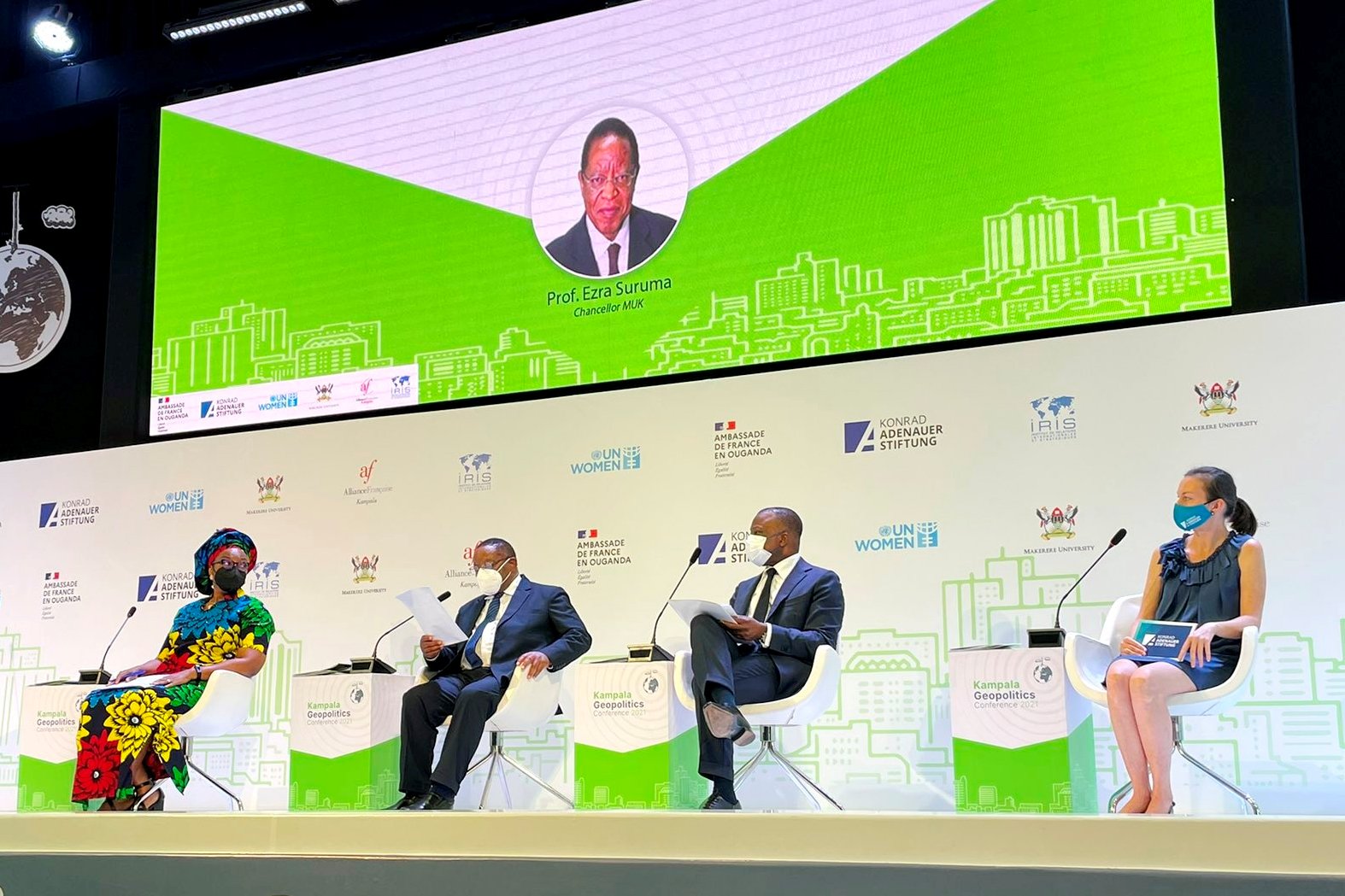
The Chancellor, Prof. Ezra Suruma while delivering his remarks at the opening ceremony of the Fourth Edition of the Kampala Geopolitics Conference has called for reflection on how COVID-19 demonstrated our interconnectedness as a human race, hence the need to work more closely together. The ceremony held in the Central Teaching Facility 2 (CTF 2) Auditorium on 10th November 2021 marked the beginning of the three-day conference on the theme; Crisis and Opportunity: Mapping the Geopolitical Importance of Africa.
“I am delighted to note that we indeed have people from many continents and as I was reflecting on this topic, it became clearer to me that indeed we live in one world. We may have lines drawn on the map and say this is Uganda, this is DRC and this is Egypt but these are lines on paper. In reality, we live in one global world” remarked Prof. Suruma.
He observed that the devastating impact of COVID-19 on the globe and the struggle to combat it through vaccination had led to a rise in vaccine nationalism. Prof. Suruma was therefore happy to learn that this topic would be discussed in depth at the conference.
The Chancellor further said that Uganda, given its location as a landlocked nation and the political developments in surrounding countries has a keen interest in geopolitics.
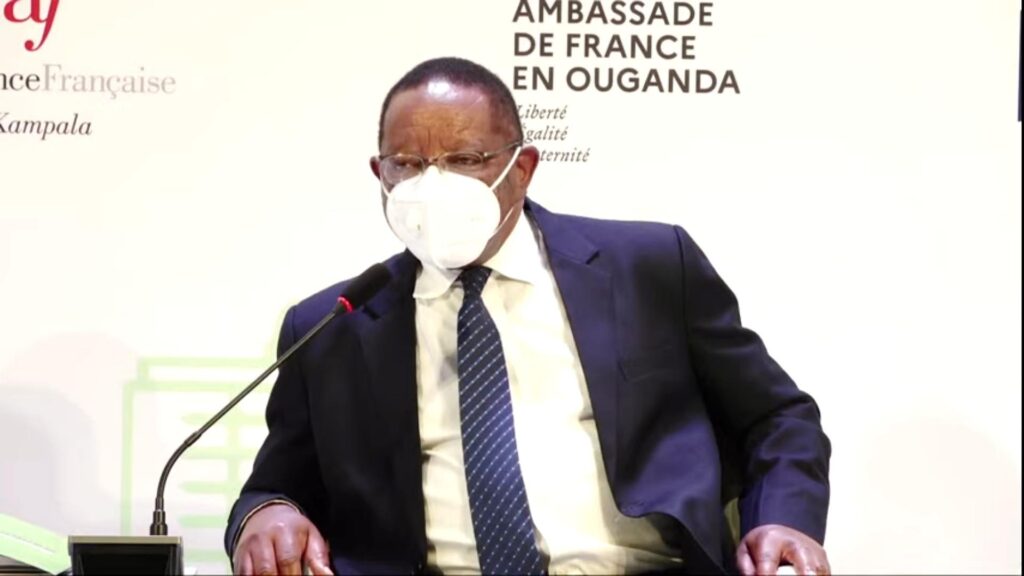
“Our hosting of large numbers of refugees, for example, is clear evidence of this fact. Geopolitics therefore is not a matter of indifference for Uganda. As seen historically and in contemporary history, Uganda has a great deal to ponder” said Prof. Suruma.
He thanked the partners Konrad-Adenauer-Stiftung, the French Embassy in Uganda, French Institute for International and Strategic Affairs, UN Women Uganda and Alliance Française for their commitment to ensuring that this important conference is held annually.
“And thank you especially for choosing Makerere University. We appreciate this vote of confidence at this time that Makerere is celebrating 100 years of service to Uganda and to the world. This year-long celebration through a series of events will be an occasion to reflect on our achievements, our successes and our failures in the past century. It will also an opportunity to lay strategies for the future” shared the Chancellor.
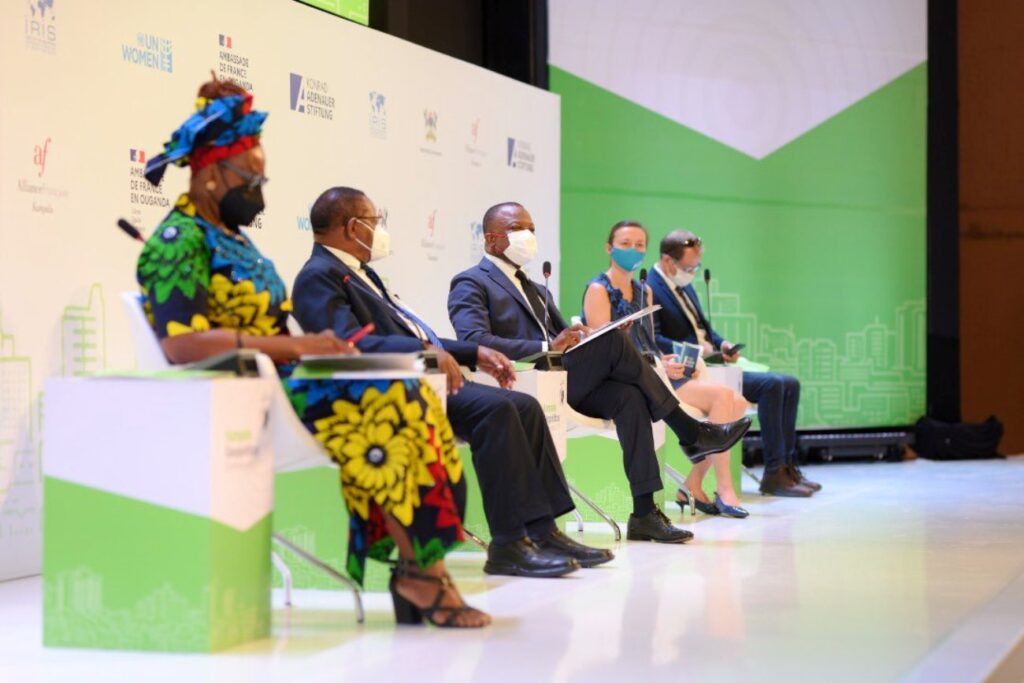
In his address, the Ambasssador of France to Uganda, H.E. Jules-Armand Aniambossou noted that as Makerere University commemorates 100 years of existence, the topic on Re-imagining Higher Education for the Post-COVID-19 Era would be of special interest to the institution and conference.
“This specific panel will open up an opportunity to re-imagine the future of Education for Africa in the context of the global family especially through the lens of digitalisation” added the Ambassador.
H.E. Aniambossou reminded the audience that one of the main ideas behind the Kampala Geopolitics Conference was to promote freedom of speech. “And I believe that as every challenge brings an opportunity, this year’s hybrid edition will enable us to give the chance to more people to enjoy this freedom of speech by interacting both physically and virtually with our guest panelists.”
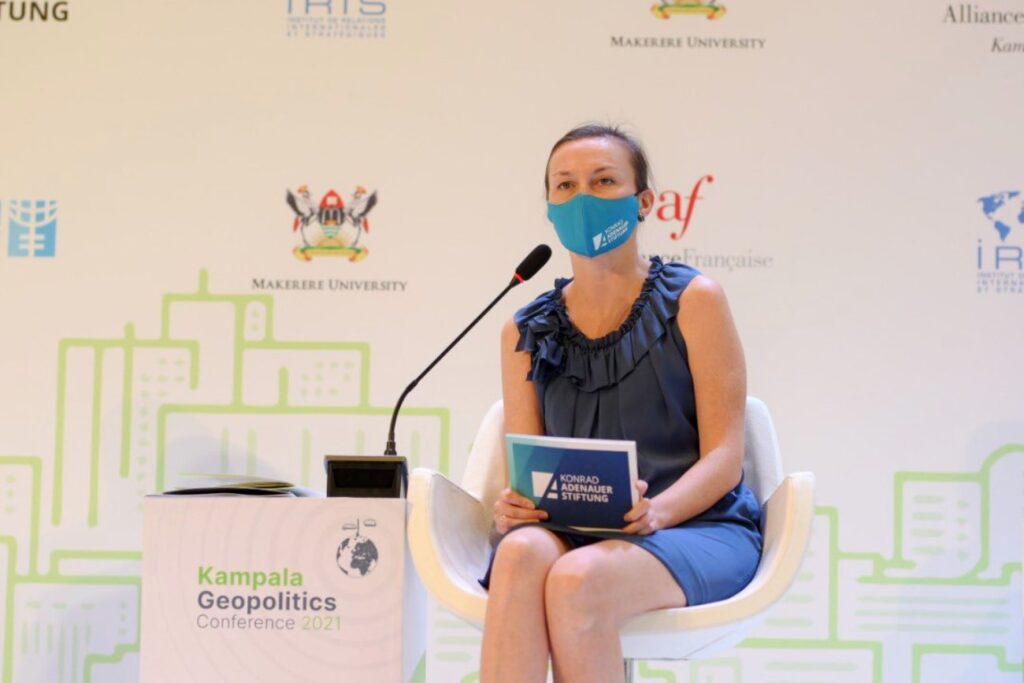
The opening ceremony was also addressed by the Konrad-Adenauer-Stiftung Country Representative, Ms. Anna Reismann who noted that a university does not exist in a vacuum but is embedded into society and has impact on its development, just as society has an impact on the institution’s life.
“Therefore, also my congratulations on successful 100 years of navigating Makerere University through different political challenges, social developments and surely, some administrative constraints. Looking into the future of the university, one is certain the challenges might change but they will also always remain” said Ms. Reismann.
Turning to the Conference theme, she noted that the crises caused by the COVID-19 pandemic and the opportunities that are arising from it have placed Africa as an important region on the global map. She added that Africa is an important player in the peace and security dialogue, as an investment destination and trading partner, as a contender in addressing global challenges as well as an arena where different powers compete for influence.
Still on the topic of influence, Ms. Sylvie Matelly, Deputy Director of the French Institute for International and Strategic Affairs (IRIS) who addressed the conference virtually admitted that it was a source of great pride for her institution, that their annual conference on contemporary international relations held in Nantes, France had birthed the idea of an annual Kampala Geopolitics Conference.
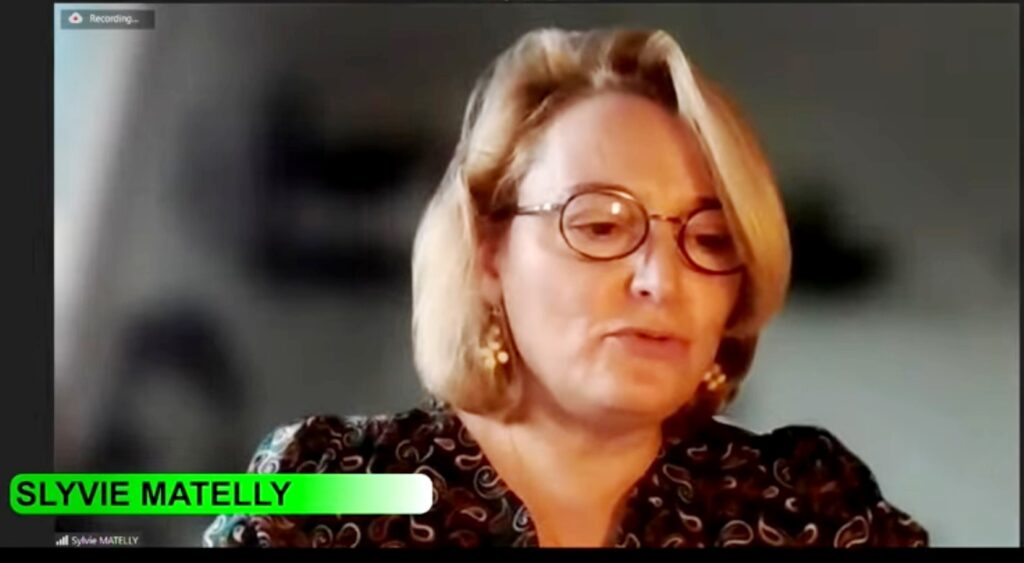
“Moreover, people used to think that because of the complexity of such topics the debate is just a private one but we are privileged that this is a public one and that is exactly why the Geopolitics of Kampala is a success year after year and I hope it will continue for a long time” remarked Ms. Matelly.
“After a very difficult period, we are pleased that we can again hold this event in person at Makerere University as we approach the 100 year celebration of the University as well as the 30th year since the foundation of Makerere University School of Women and Gender Studies” said Ms. Adekemi Ndieli, Deputy Country Representative UN Women, Uganda as she commenced her remarks.
Quoting the former US Secretary of State Madeleine Albright, Ms. Ndieli said “The world is wasting a precious resource as the dramatic underrepresentation of women which results in exclusion of talents and skills in the economy.”
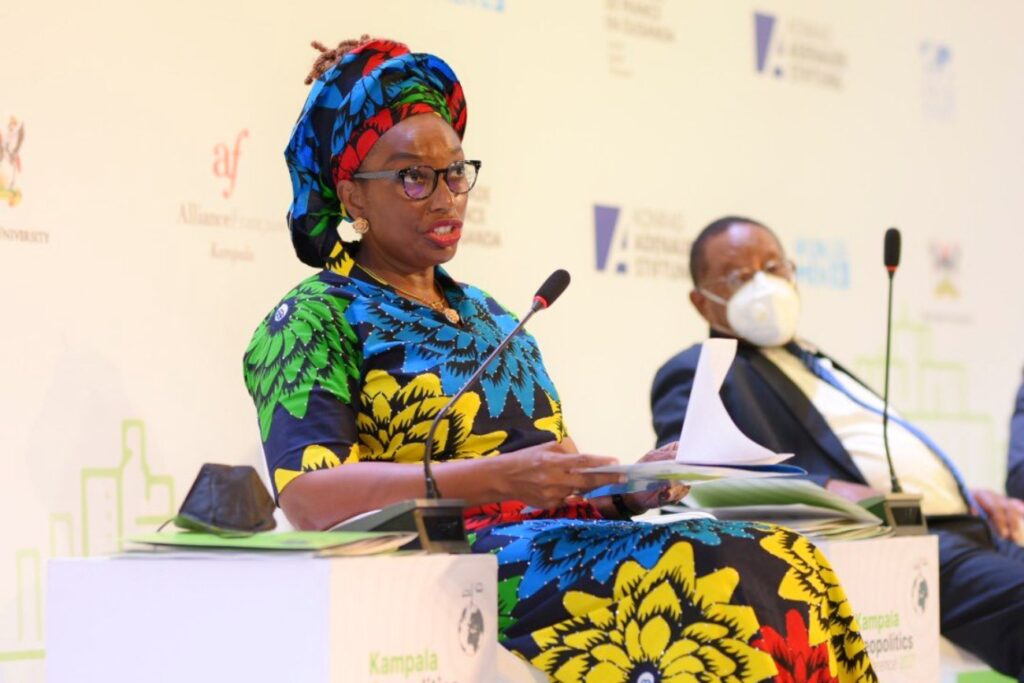
She therefore said that the Kampala Geopolitics Conference is an important opportunity for UN Women to elevate women’s voices and hear their input and solutions across a broad range of topics. The topics range from climate action to feminist movements building to transitional justice and to engagement in outer space. The elevation, she noted, should be viewed in the light that gender equality is not only a pressing moral or social imperative but is a critical economic challenge.
“Ladies and gentlemen, we are living in unprecedented times as we all know and the COVID-19 pandemic has presented us one of the greatest challenges of our generation. Beyond the virus itself the response to COVID-19 has exposed deep inequalities in our societies and in global partnerships across the world” she added.
Ms. Ndieli continued to say that whereas COVID-19 had had disproportionate and devastating effects on social and economic life, these effects were more pronounced among the most vulnerable and as such, had tested the ability of states to come together to address the global challenges. “However, it has also presented us with unprecedented opportunities to build back better.”
The opening ceremony was followed by a panel discussion on Re-imagining Higher Education for the Post-COVID-19 Era, where the Vice Chancellor, Prof. Barnabas Nawangwe was joined by Ms. Sylvie Matelly, Mr. Benjamin Rukwengye, Founder and CEO – Boundless Minds Uganda and Moderator Mr. James Kassaga , ED and Co-Founder – Teach for Uganda.
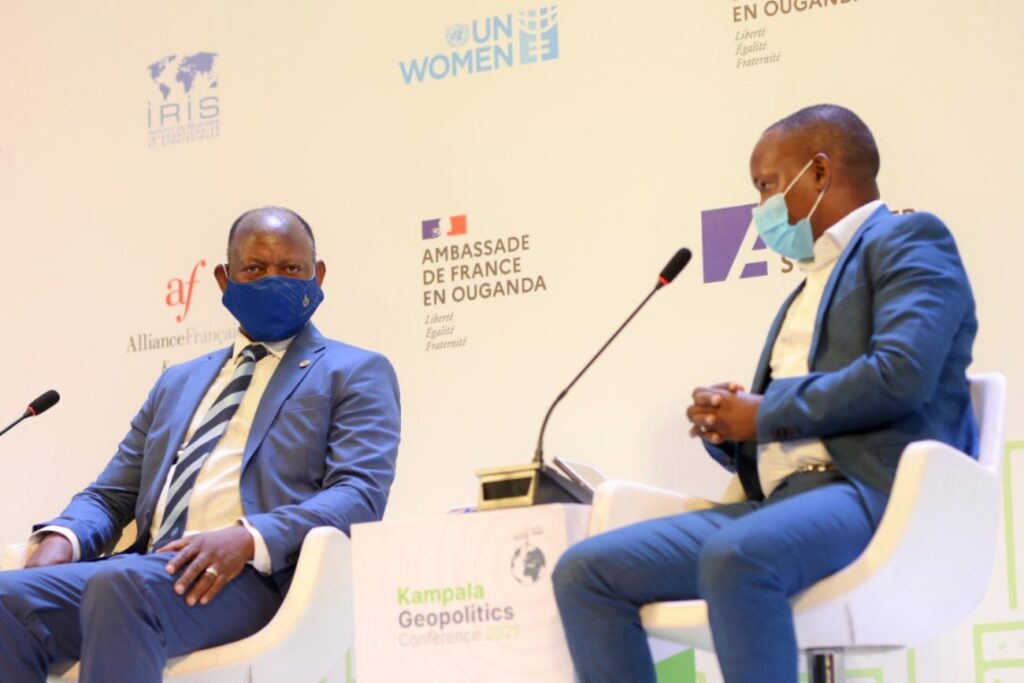
The Vice Chancellor shared that through partnerships with international collaborators, Makerere University had built a formidable force of academics that do research in all areas, and in the case of COVID-19, were very much aware of issues to do with online education.
“Online education is the future, even without the pandemic” said Prof. Nawangwe. “If Uganda’s population doubles, with the infrastructure we have now, we cannot take in all those children who will be seeking higher education” he added.
Prof. Nawangwe said the university had taken advantage of the resources it had to train all staff in online education as well as alternative methods of education. This, he said, had ensured that Makerere had not suffered as much as the rest of the Ugandan education sector during COVID-19.
“We as the leading university have got the responsibility and obligation to support the other universities and other institutions to come out of this. And we are currently working with organizations around the world to train our colleagues at other universities on online education” said Prof. Nawangwe.
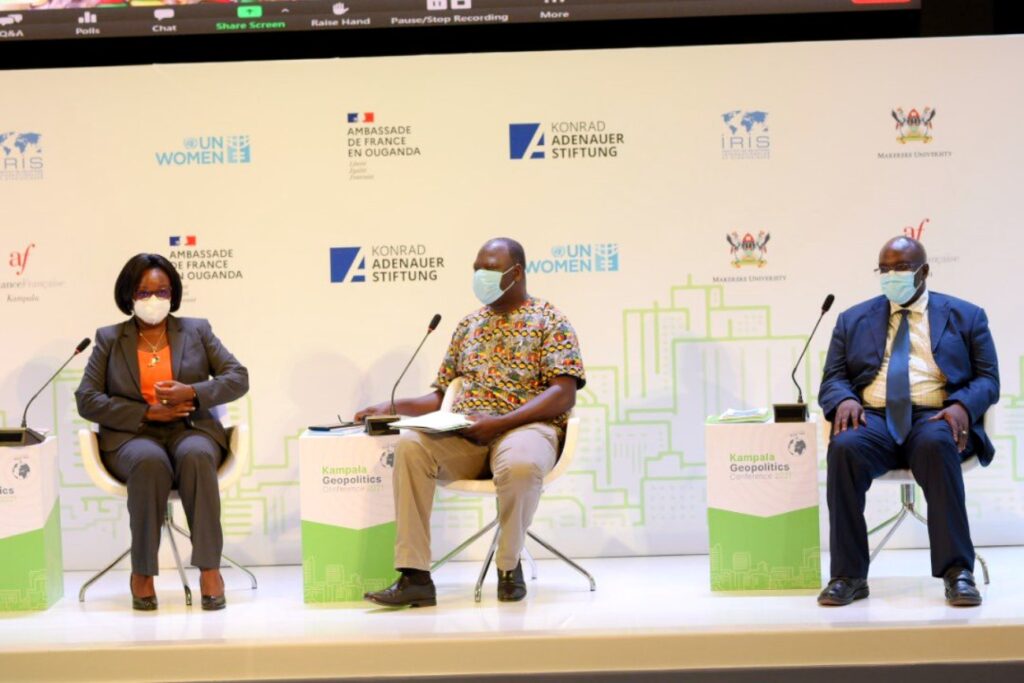
This panel was followed by another on Vaccine Nationalism and Diplomacy in the Times of the Pandemic, moderated by Dr. Milton Mutto, a Global Health Research Scientist. Panelists included Ms. Anne Senequier (IRIS), Dr. Alfred Driwale (MoH), Prof. Rhoda Wanyenze, Dean, Makerere University School of Public Health, Dr. Olaf Wientzek (KAS Geneva) and Mr. Andrew Bakainanga (WHO).
Prof. Wanyenze in her submission had noted that the struggle of who wins the vaccine war had given rise to a vaccine infodemic characterized by misinformation about the efficacy of some vaccines, resulting in their rejection by some sections of the public.
Touching on vaccine equity, she noted that up to 90% of the world vaccine market is controlled by a few companies, resulting in scarcity of vaccines such as the Covid-19 one, even for nations that had the money to purchase them.
“We talked about test kits for COVID-19. At the beginning you could hardly get them and buy them even when you had the money on the table. It was just the same dynamics as what you see for the COVID-19 vaccines. The same is true for the new COVID-19 drugs” she shared.
The Fourth Edition of the Kampala Geopolitics Conference that runs until Friday 12th November 2021 has adopted the format of Twitter Spaces at 12:30 PM on Day 1 and Day 2 as well as at 7:00 PM on all three days.
Join the Conversation using the #KampalaGeopolitics hashtag.
You may like
-


Over 9,200 to graduate at Makerere University’s 76th Graduation
-


Meet Najjuka Whitney, The Girl Who Missed Law and Found Her Voice
-


Makerere University School of Public Health Graduates First Cohort of Cost-Effectiveness Analysis Short Course
-


Climate variability found to shape malaria trends in Yumbe District
-


Mak hosts First African Symposium on Natural Capital Accounting and Climate-Sensitive Macroeconomic Modelling
-


Uganda Martyrs Namugongo Students Turn Organic Waste into Soap in an Innovative School Project on Sustainable Waste Management
General
Over 9,200 to graduate at Makerere University’s 76th Graduation
Published
4 hours agoon
February 24, 2026
Pomp and colour defined the opening day of the Makerere University’s 76th Graduation Ceremony as thousands gathered to celebrate academic excellence and new beginnings.
The historic ceremony has brought together scholars, families, friends and industry partners in a vibrant celebration of achievement and possibility. Throughout the four-day event, the University will confer degrees and award diplomas to 9,295 graduands in recognition of their dedication and hard work.
Among the graduates, 213 will receive Doctor of Philosophy (PhD) degrees, 2,503 will graduate with Master’s degrees, and 6,343 will earn Bachelor’s degrees. In addition, 206 students will graduate with postgraduate diplomas, while 30 will be awarded undergraduate diplomas.
Of the total number of graduands, 4,262 are female and 5,033 are male. According to Vice Chancellor, this marks the first time in 15 years that male graduands have outnumbered their female counterparts.
The best overall graduand in the Sciences, Esther Ziribaggwa, graduated on the opening day with the Bachelor of Agricultural and Rural Innovation and an impressive Cumulative Grade Point Average (CGPA) of 4.77.

The ceremony marks a proud moment for Makerere University as it continues to nurture top-tier professionals across diverse fields.
While presiding over the graduation, the State Minister for Primary Education, Hon. Dr. Joyce Moriku Kaducu, on behalf of the First Lady and Minister of Education and Sports, Hon. Janet Kataaha Museveni, pointed out that Makerere University is a model institution, where leaders are nurtured, scholars are sharpened, and where dreams have been given direction.
In her address, Hon. Museveni, highlighted Government’s deliberate investment in research, innovation, and infrastructure to strengthen higher education in Uganda.
“The establishment of the Makerere University Research and Innovation Fund (RIF), supports high-impact research and innovation that directly contributes to national priorities and development. Through this initiative, thousands of researchers and innovators have pursued practical, scalable solutions that are transforming communities and key sectors across Uganda,” Mrs Museveni, said.
The Minister also noted that Parliament’s approved a USD 162 million concessional loan to upgrade science, technology, and innovation infrastructure at Makerere University. The funding will facilitate the construction of modern laboratories, smart classrooms, and state-of-the-art facilities for Engineering and Health Sciences, investments expected to position the University firmly within the Fourth Industrial Revolution.
“Government has embarked on the construction of a National Stadium at Makerere University and other institutions of higher learning across the country. This will promote physical education, strengthen talent identification, and boost investment in the sports sector,”

Turning to the graduands, the Minister encouraged them to see themselves not merely as job seekers, but as job creators and solution-makers.
Uganda and Africa need innovators who will modernize agriculture; engineers who will build quality infrastructure; healthcare professionals who will strengthen health systems; and educators who will inspire the next generation,” the Honourable Minister said.
She reminded graduates that they are entering a rapidly changing world shaped by Artificial Intelligence, climate change, and shifting global markets. To thrive, she advised them to remain adaptable, creative, and committed to lifelong learning.
She also encouraged graduates interested in entrepreneurship to tap into the Government’s Parish Development Model, which provides community-based financing and production support.
Quoting Proverbs 3:5–6, the Minister urged the graduates to trust in God as they embark on their next chapter.
She extended special appreciation to the Mastercard Foundation for its 13-year partnership with Makerere University in expanding access to education and empowering young people in Uganda and beyond.
In his speech, the Chancellor of Makerere University, Dr Crispus Kiyonga, urged graduands to harness research, innovation and technology to drive Uganda’s transformation.

“This is a milestone in your lives. You have invested time, discipline and hard work to attain these qualifications. It is important that you derive value from this achievement, not only for yourselves, but for your families and for society.” Dr Kiyonga, said.
Dr. Kiyonga expressed gratitude to the Government of Uganda for its continued financial support to the University, particularly the funding allocated under MakRIF, which he described as critical in strengthening the institution’s research capacity.
“Research plays a very vital role in the development of any community. Makerere as the oldest University in the country is doing a significant amount of research, However, more work is required to mobilize additional resources to further strengthen research at the University.” Dr Kiyonga, noted.
Acknowledging the challenges of a competitive job market, Dr. Kiyonga encouraged graduates to think beyond traditional employment pathways.
“It is true that the job market may not absorb all of you immediately. But the knowledge you have acquired is empowering. You can create work for yourselves, individually or in teams.” Dr Kiyonga, said.
He advised the graduands to embrace discipline, integrity and adaptability in the workplace, and to take advantage of technology and digital platforms to innovate and respond to societal challenges.
“Every development challenge presents an opportunity. Believe that you can apply your knowledge to create solutions with impact.” He said.
Addressing the congregation, the Vice Chancellor, Prof Barnabas Nawangwe, congratulated the graduands, particularly staff and societal leaders on their respective achievements.

“I congratulate all our graduands upon reaching this milestone. In a special way I congratulate the members of staff, Ministers, and Members of Parliament that are graduating today as well as children and spouses of members of staff,” Prof Nawangwe, said.
In his speech, Prof Nawangwe, recognized outstanding PhD students, particularly members of staff. who completed their PhDs in record time without even taking leave from their duties.
He called upon graduates not to despise humble beginnings but rather reflect on the immense opportunities around them and rise to the occasion as entrepreneurs.
“You are all graduating with disciplines that are needed by society. We have equipped you with the knowledge and skills that will make you employable or create your own businesses and employ others. Do not despair if you cannot find employment. Instead, reflect on the immense opportunities around you and rise to the occasion as an entrepreneur,” Prof Nawangwe, said.
Prof Nawangwe called upon the graduands of PhDs to use their degrees to transform the African continent.
“As you leave the gates of Makerere I urge you to put to good use the knowledge you have received from one of the best universities in the World to improve yourselves, your families, your communities, your Country and humanity. Let people see you and know that you are a Makerere alumnus because of the way you carry yourself in society with dignity and integrity. Put your trust in God and honour your parents and opportunities will be opened for you,” Prof Nawangwe, said.
Delivering a key note address, Prof. Nicholas Ozor, the Executive Director of the African Technology Policy Studies Network Nairobi, Kenya ((ATPS). Reminded the graduates that a degree is not a finish line but the beginning of accountability. “The world is a complex, fast changing and deeply unequal. Degrees make you responsible for others not better than them,” Prof Ozor, said.

The 76th Graduation Ceremony of Makerere University will be held from Tuesday 24th to Friday 27th February, 2026. A total of 213 PhDs (87 female, 126 male), 2,503 Masters (1,087 female, 1,416 male), 206 Postgraduate Diplomas (80 female, 126 male), 6,343 Undergraduate Degrees (2,999 female, 3,344 male), and 30 Undergraduate Diplomas (9 female, 21 male) will be graduating from all the Colleges.
Ms. Sarah Aloyo and Ms. Nakato Dorothy both students of the Bachelor of Procurement and Supply Chain Management emerged as the best in the Humanities and Best Overall students with a CGPA of 4.93. Mr. Ssewalu Abdul, a Bachelor of Leisure and Hospitality Management student emerged second best in the Humanities with a CGPA 4.90. Ms. Esther Ziribaggwa emerged as the best student in the Sciences with a CGPA of 4.77 in the Bachelor of Agricultural and Rural Innovation, while Mr. Simon Mungudit emerged second best in the Sciences with a CGPA of 4.76 in the Bachelor of Science in Petroleum Geoscience and Production.
Commencement Speakers
- Day 1 – Prof. Nicholas Ozor, the Executive Director of the African Technology Policy Studies Network, Nairobi, Kenya
- Day 2 – Prof. Dr. Maggie Kigozi, Chairperson Makerere University Endowment Fund Board
- Day 3 – Dr. Patricia Adongo Ojangole, Managing Director, Uganda Development Bank Limited
- Day 4 – Ms. Reeta Roy, Former President & Chief Executive Officer, Mastercard Foundation
The 76th Graduation Ceremony will be held at the Freedom Square following the schedule below:
Tuesday, 24th February, 2026
College of Agricultural and Environmental Sciences (CAES)
College of Computing and Information Sciences (CoCIS)
College of Education and External Studies (CEES)
School of Law (SoL)
Livestream Link for Day 1: https://youtube.com/live/wVGPA0FJ9pU
Wednesday, 25th February, 2026
College of Health Sciences (CHS)
College of Natural Sciences (CoNAS)
College of Veterinary Medicine, Animal Resources and Bio-security (CoVAB)
School of Public Health (SPH)
Thursday, 26th February, 2026
Makerere University Business School (MUBS)
College of Business and Management Sciences (CoBAMS)
Friday, 27th February, 2026
College of Engineering, Design, Art and Technology (CEDAT)
College of Humanities and Social Sciences (CHUSS)
Institute of Gender and Development Studies (IGDS)
Makerere Institute of Social Research (MISR)
General
Mak Selected to Host Alliance for African Partnership Africa Office
Published
1 day agoon
February 23, 2026
Makerere University has been selected to host the Africa Office of the Alliance for African Partnership (AAP). The significant milestone that underscores Makerere’s role in fostering research, innovation, and global collaborations across the continent was announced at a meeting of the University’s Central Management with an AAP delegation on 23rd February 2026.
Makerere’s selection was based on the University’s robust commitment, alignment with the AAP’s Strategic Plan, and proven ability to manage consortium activities. The AAP, which was initiated by Michigan State University (MSU) in collaboration with Ten African Universities and agricultural policy research networks in 2016, targets critical challenges in education, youth empowerment, health and nutrition, agri-food systems, science and technology, water, energy, environment, and culture and society.
Addressing the delegation consisting of AAP Co-Directors from MSU, Dr. Jose Jackson-Malete and Dr. Amy Jamison, accompanied by newly-appointed Director of the AAP Africa Office, Dr. Racheal Ddungu Mugabi and Ms. Clare Cheromoi, the Vice Chancellor, Prof. Barnabas Nawangwe who appreciated the choice of Makerere to host the Africa Office said:
“One of the greatest challenges facing African universities is PhD training, particularly supervisory capacity. Through partnerships such as the Alliance for African Partnership we can leverage international expertise to strengthen supervision—whether through training supervisors or through joint supervision arrangements.”
Prof. Nawangwe equally applauded joint initiatives such as the Grant Writing and Publication project, which gave rise to the establishment of a Writing Centre that he said can be used to build capacity in AAP member universities with Makerere as the hub. Officially launched on 21st March 2023, the project is living up to its expectation of becoming a springboard for strong postdoctoral collaborative research for both institutions and other US universities.
Dr. Titus Awokuse, Vice Provost and Dean for International Studies and Programs at Michigan State University (MSU) who attended virtually, reiterated that Makerere’s selection reflects its long-standing commitment to advancing African higher education, research excellence, and meaningful global collaboration.
Reflecting on the origins of the Alliance for African Partnerships (AAP), Dr. Awokuse explained that nearly a decade ago, MSU initiated a transformative conversation in Atlanta centered on the question: How should we partner differently? From this dialogue emerged AAP—an Africa-centered consortium that now brings together 12 institutions across Africa and the United States.

He emphasized that AAP is grounded in equity, mutual benefit, shared leadership, and deep respect for African priorities and expertise. Since its founding, MSU has served as convener and key supporter, working with member institutions to strengthen research collaboration, promote faculty and student engagement, and address shared development priorities.
Dr. Awokuse underscored that AAP’s success is the result of collective vision and commitment, not the efforts of a single institution. He paid tribute to Lilongwe University of Agriculture and Natural Resources for hosting the Africa Office in its early years and acknowledged the foundational leadership of the inaugural Africa Office Director.
He described the launch of the Africa Office at Makerere University as a significant milestone that reinforces Africa-led leadership, strengthens regional collaboration, and enhances responsiveness to emerging opportunities. MSU, he affirmed, remains fully committed to AAP and to working closely with Makerere and all consortium partners to expand collaborative research, nurture the next generation of scholars, and advance Africa-led solutions to global challenges.
The newly-appointed AAP Africa Office Director, Dr. Racheal Ddungu Mugabi is a member of faculty in the Department of Development Studies, Institute of Gender and Development Studies. Her work on intersectional inequalities in Uganda and other Global South regions uniquely positions her to drive collaborative research and partnerships at the Africa Office.
Initially founded by ten African Universities and MSU, AAP now comprises eleven African members including; the African Network of Agricultural Policy Institutes (ANAPRI)-Zambia, Egerton University-Kenya, Lilongwe University of Agriculture and Natural Resources (LUANAR)-Malawi, Makerere University-Uganda, United States International University-Africa-Kenya, Universite Cheikh Anta Diop-Senegal, Universite Yambo Ouologuem de Bamako-Mali, University of Botswana-Botswana, University of Dar es Salaam-Tanzania, University of Nigeria, Nsukka-Nigeria, and the latest, University of Pretoria-South Africa.
These Universites collaborate under Focal Points to advance policy-relevant research and sustainable development. Makerere University’s Focal Point is Prof. Robert Wamala, Director of Research, Innovations and Partnerships (DRIP).
Addressing the University Management, Dr. Jackson-Malete outlined the African Futures Research Leadership Program, which nurtures early career scholars through mentorship and skill-building as one of AAP’s flagship programs. She noted that the Program that prioritizes female participants or men committed to promoting women in higher education has for the first time during its fifth cohort admitted the first male, Dr. Alfadaniels Mabingo from the Department of Performing Arts and Film, Makerere University.
The AAP Africa Office at Makerere will coordinate activities, boost research collaboration, mobilize resources, and enhance global engagements for socio-economic transformation. This aligns with Makerere‘s broader goals of leveraging international expertise to build resilient institutions.
View more photos from the event: https://flic.kr/s/aHBqjCLjoA
Trending
-

 Humanities & Social Sciences2 days ago
Humanities & Social Sciences2 days agoMeet Najjuka Whitney, The Girl Who Missed Law and Found Her Voice
-

 Health6 days ago
Health6 days agoUganda has until 2030 to end Open Defecation as Ntaro’s PhD Examines Kabale’s Progress
-

 Agriculture & Environment5 days ago
Agriculture & Environment5 days agoUganda Martyrs Namugongo Students Turn Organic Waste into Soap in an Innovative School Project on Sustainable Waste Management
-

 General6 days ago
General6 days agoMastercard Foundation Scholars embrace and honour their rich cultural diversity
-

 Health2 weeks ago
Health2 weeks agoCall for Applications: Short Course in Molecular Diagnostics March 2026
